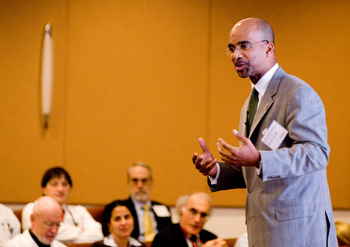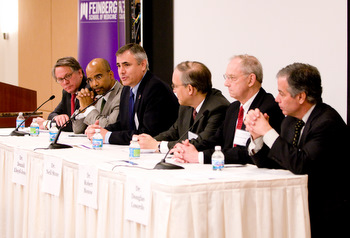Feinberg Cardiovascular Symposium Focuses on Reinventing, Restoring Heart Health
 |
| Clyde Yancy, MD, medical director at the Baylor Heart and Vascular Institute and chief of cardiothoracic transplantation at Baylor University Medical Center, offered a vision for how individuals, organizations, and Northwestern Medicine can participate in reinventing and restoring heart health. |
Despite advances in diagnosis and treatment, cardiovascular disease remains the number one cause of death worldwide. Officials estimate that more than 860,000 Americans die annually from conditions like heart attacks, strokes, congestive heart failure, and other diseases of the circulatory system. Northwestern University Feinberg School of Medicine recently hosted a symposium highlighting how the university and its affiliates are partnering to curb these statistics and strengthen heart health.
The event, “Transforming Heart Disease: Reinventing Risk and Restoring Health,” was led by Douglas Vaughan, MD, Irving S. Cutter Professor of Medicine and chair of the Department of Medicine. Vaughan underscored the medical school’s significant role at the 2010 American Heart Association (AHA) Scientific Sessions held November 13-17 in Chicago, where Feinberg faculty proved their leadership in cardiovascular medicine, sharing their major contributions to the field.
“We are pursuing new discoveries at Northwestern, new ways of preventing and treating heart disease, and we’re studying cardiovascular innovation, quality, and outcomes,” Vaughan said. “Our contributions over the last decade include helping to establish national cholesterol guidelines and defining the new concept of cardiovascular health for the AHA.”
Vaughan was followed by Clyde Yancy, MD, medical director at the Baylor Heart and Vascular Institute and chief of cardiothoracic transplantation at Baylor University Medical Center, who offered the evening’s keynote speech. In his presentation, Yancy offered a vision for how individuals, organizations, and Northwestern Medicine can further participate in the cause.
“Steps to transformation include research, treatment paradigms, prevention approaches, and education,” Yancy said. “Here at Feinberg, you have an amazing collection of talented investigators, innovators, and leaders. You have the intellectual capital and are fully equipped to be transformative.”
President of the AHA during its 2009 fiscal year, Yancy’s address also emphasized the association’s goals to improve the cardiovascular health of all Americans by 20 percent and to reduce deaths from heart disease and stroke by 20 percent by the year 2020.
“We need to see and treat heart disease differently,” said Yancy. “Northwestern should leverage its strength and depth in cardiovascular medicine to make an impact in Chicago and across the world.”
 |
| A panel discussion focused on the recent advancements in cardiovascular medicine, particularly the role feinberg plays in strengthening heart health across the globe. |
The event concluded with a panel discussion that explored the positive strides made in cardiovascular medicine. In addition to Vaughan and Yancy, speakers included:
- Robert O. Bonow, MD, Max and Lilly Goldberg Distinguished Professor of Cardiology; chief in the Division of Cardiology; vice chair for development and innovation in the Department of Medicine; and director of the Center for Cardiovascular Innovation
- Donald Lloyd-Jones, MD, associate professor of preventive medicine and medicine and chair of the Department of Preventive Medicine
- Douglas Losordo, MD, Eileen M. Foell Professor of Heart Research; director of the Feinberg Cardiovascular Research Institute; and director of the Program in Cardiovascular Regenerative Medicine
- Neil Stone, MD, professor in the Division of Cardiology; Suzanne and Milton Davidson Distinguished Physician at Northwestern Memorial Hospital; and medical director of the Bluhm Cardiovascular Institute Center for Vascular Disease
Lloyd-Jones — recently honored with the AHA Chairman’s Award for his contributions to the 2020 AHA Strategic Vision — said that experts have determined a template for better health that monitors factors like blood pressure, blood sugar, and blood cholesterol, and behaviors like weight, smoking, exercise, and diet. Now, efforts focus on determining how to move people from childhood to middle-age while avoiding risk for heart disease.
“Less than 1 percent of Americans meet the requirements for optimal cardiovascular health,” Lloyd-Jones said. “We need to translate our knowledge into public policies that have an impact on the disease and the people it plagues.”
While Lloyd-Jones’ work focuses primarily on prevention, Losordo and his team lead the nation’s largest phase 2 study of cardiac repair for peripheral vascular disease. His cutting edge research in regenerative medicine involves treating heart patients with a single dose of their own stem cells.
“Recent findings show the first evidence that this process of controlling the regrowth of blood vessels can do long-lasting good in patients,” said Losordo. “I think our research demonstrates that the key ingredient for transformation is an appetite for doing so.”






